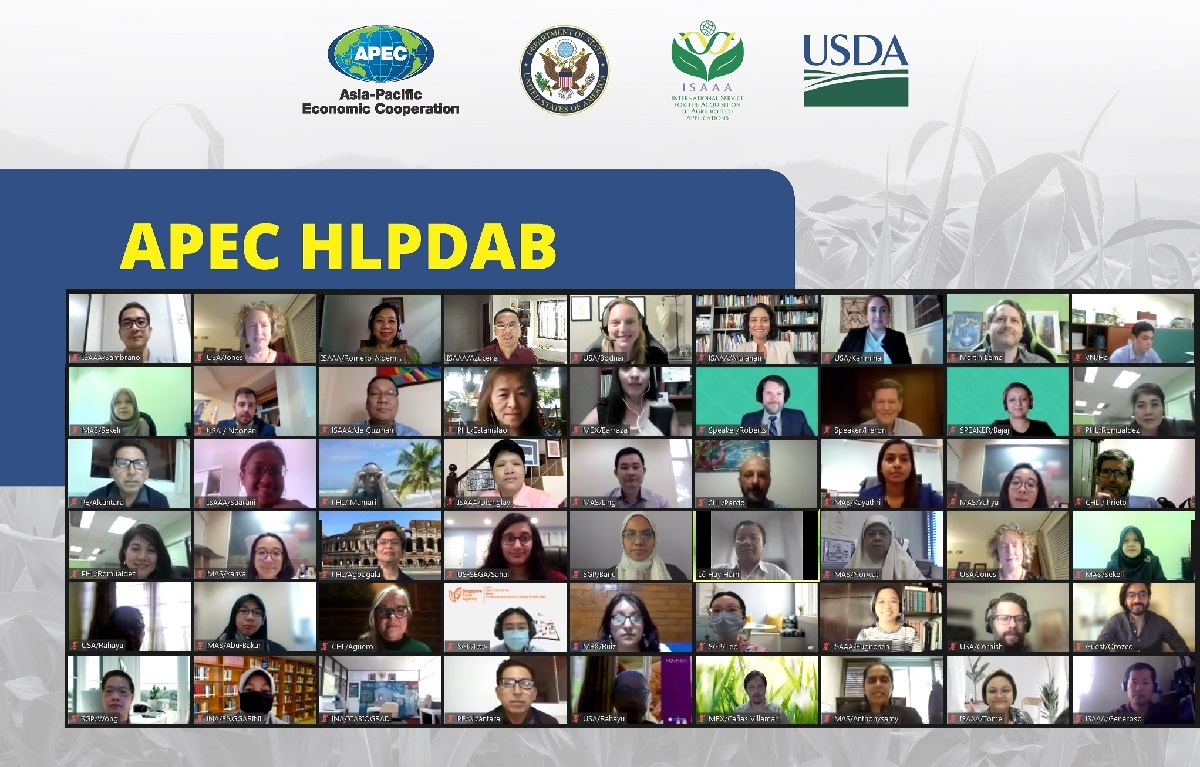APEC Economies Discuss Developments in Biotech Regulations
| |

The Asia-Pacific Economic Cooperation (APEC) High Level Policy Dialogue on Biotechnology (HLPDAB), ISAAA, United States Department of State and United States Department of Agriculture (USDA) held a virtual workshop on Building Regulatory Capacities for Biotechnology (Genetic Engineering, GE) on April 27 and 28, 2021. The objective was to discuss the development and review of APEC member economies’ regulatory capacities for biotechnology, particularly in genetic engineering. It was hosted by the United States and implemented by ISAAA, with 54 participants from 10 member economies in attendance.
Identifying Pressing Challenges
The workshop tackled topics such as the challenges in implementing regulatory policies by member economies. Here, selected participants were given the opportunity to share their respective economy’s status in biotechnology research, policy, and commercialization, if applicable. Most notable during this session were the identification of challenges met by each economy, as these became the setting ground for further discussion on how to address the challenges as well as identifying lessons from experiences of other economies who have continuously improved their own biotech industries.
Exchanging of Knowledge and Experiences
To guide member economies on the processes of implementing regulatory frameworks, a presentation on the implications of the Cartagena Protocol on Biosafety in the inter-boundary movement of biotech products was discussed. The discussion also focused on labeling, GE event detection, risk assessment, the use of precautionary principle, regulatory harmonization, and capacity building for parties implementing the Protocol domestically.
Resource speakers from four selected economies detailed regulatory policies that streamlined approval and facilitated commercialization of GE events. These include the implementation of a simplified approval in Paraguay, the customs union agreement between Honduras and Guatemala, Viet Nam’s recognition of approvals conducted by OECD and the G20 economies on GE events, and Nigeria’s approval of Bt cowpea following a complete risk assessment. The session was aimed to guide economies in the review and revision of their biotechnology framework.
A session to present the elements of a gold standard science-based regulatory framework was conducted to further provide pointers to the economies. The regulatory framework should be transparent, predictable, efficient, timely, the regulatory burden being proportionate to regulatory goals and there should be clarity of purpose in risk assessment. This was complemented by a presentation on the resources that regulators can utilize to implement policies effectively and efficiently.
Establishing Connections
For the last session, participants and resource speakers alike shared their thoughts and takeaways in an in-depth discussion on how to apply the knowledge exchanged during the workshop to improve the individual economy regulatory policies and framework, if necessary, and to select an economy regulator that can be consulted in the process. The workshop also became an avenue for the participants to form their network of contacts to consult and share best practices to gain more knowledge. The learnings are expected to be applied to address their respective economy’s concern, or initiate innovations on improving their biotech research and industry. The output of the online workshop will be used to continue on with the next activities of the HLPDAB for 2021.
| Newer Post | Archive | Older Post |
Science Speaks is ISAAA Inc.'s official blog. Weekly blog articles, authored by ISAAA writers, partners, and invited contributors, aim to help share, disseminate, and promote scientific knowledge and its vital role in achieving global agricultural sustainability and development. Your support to Science Speaks will help us achieve this goal. You can help us by donating as little as $10.

